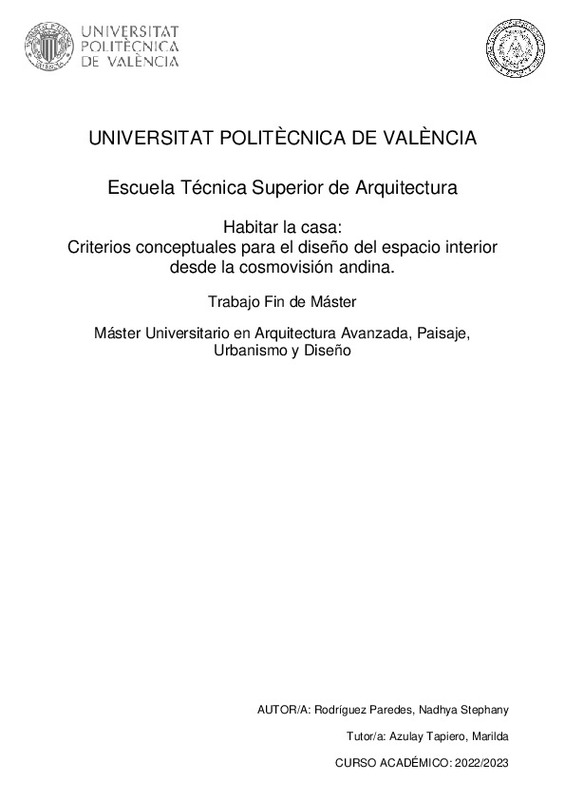|
Resumen:
|
[ES] El espacio que habitamos, una interpretación condicionada de la casa en la que ubicamos nuestros objetos, se despliega de la necesidad de ocupar y definir el espacio donde vamos a refugiarnos; lo que pretendo desde ...[+]
[ES] El espacio que habitamos, una interpretación condicionada de la casa en la que ubicamos nuestros objetos, se despliega de la necesidad de ocupar y definir el espacio donde vamos a refugiarnos; lo que pretendo desde este Trabajo Final de Máster es implementar, desde la arquitectura contemporánea, criterios conceptuales para el establecimiento de estrategias y métodos como diferentes alternativas, para poder crear espacios acordes a la cosmovisión de sus ocupantes.
Acotando el objeto del trabajo, se plantea la cosmovisión andina y el estudio de un caso: ¿habitar una casa unifamiliar tipo en la ciudad de Riobamba-Ecuador¿. Caso que nos introducirá en un mundo de costumbres, tradiciones y características propias del ocupante del espacio de estudio, en la búsqueda de su cooperación en la creación de un ambiente más confortable, seguro, donde poder vivir en las condiciones óptimas desde su cosmovisión.
Para el diseño de dicha casa unifamiliar tipo, objeto de análisis, aportada por el Ministerio de Desarrollo Urbano y Vivienda (MIDUVI), se ha recurrido a la orientación, el clima, el asoleamiento, los vientos y las normativas, también de habitabilidad, que rige cada municipalidad, pero no se ha llegado a abordar otros recursos como, entre ellos, contemplar y analizar las rutinas de vida de sus usuarios, enterarnos de sus memorias, o investigar sobre el sitio donde se ubicará la casa y su historia.
El estudio se centra, por tanto, desde un marco conceptual establecido, en alcanzar criterios, como construcción teórica que ayuden a establecer estrategias, métodos y herramientas para crear ambientes confortables desde la cosmovisión andina; es decir, y básicamente, desde la conexión entre la trilogía formada por el cosmos (Hanan Pacha), el hombre (Uku Pacha) y la naturaleza (Qui Pacha) y las potencialidades de los conocimientos de nuestros ancestros y el objetivo de vivir sabiamente (Sumak kawsay); para su posterior aplicación en el caso de estudio hasta alcanzar las conclusiones finales.
[-]
[EN] The space we inhabit, a conditioned interpretation of the house in which we
place our objects, unfolds from the need to occupy and define the space
where we are going to take refuge; What I intend from this Final ...[+]
[EN] The space we inhabit, a conditioned interpretation of the house in which we
place our objects, unfolds from the need to occupy and define the space
where we are going to take refuge; What I intend from this Final Master’s
Project is to implement, from contemporary architecture, conceptual criteria for the establishment of strategies and methods as different alternatives,
in order to create spaces according to the worldview of their occupants.
Delimiting the object of the work, the Andean worldview and the study of
a case are considered: “inhabiting a typical single-family house in the city
of Riobamba-Ecuador”. Case that will introduce us to a world of customs,
traditions and characteristics of the occupant of the study space, in search
of their cooperation in the creation of a more comfortable, safe environment, where they can live in optimal conditions from their worldview.
For the design of said single-family house, object of analysis, provided
by the Ministry of Urban Development and Housing (MIDUVI), orientation, climate, sunlight, winds and regulations, also habitability, have been
used, which governs each municipality, but other resources have not been
addressed, such as, among them, contemplating and analyzing the life
routines of its users, finding out about their memories, or investigating the
place where the house will be located and its history.
The study focuses, therefore, from an established conceptual framework,
on reaching criteria, as a theoretical construction that helps establish strategies, methods and tools to create comfortable environments from the Andean worldview; that is to say, and basically, from the connection between
the trilogy formed by the cosmos (Hanan Pacha), man (Uku Pacha) and
nature (Qui Pacha) and the potential of the knowledge of our ancestors
and the objective of living wisely ( Sumak kawsay); for its subsequent application in the case study until reaching the final conclusions.
[-]
|







